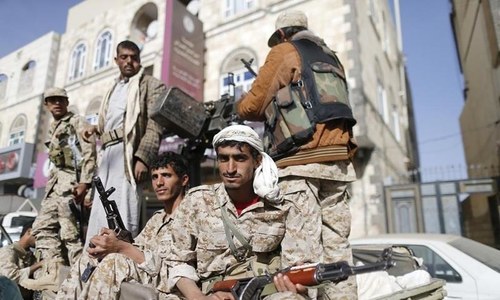Yemen's Saudi-backed government said on Wednesday it would not hold talks with southern separatists unless they hand back control of Aden port, after the separatist chief arrived in Saudi Arabia to discuss the standoff between the two sides.
Saudi Arabia, leader of a military coalition that includes the separatists, called for a summit after southern forces on Aug 10 took over Aden, the interim seat of the government, in a move that fractured the Sunni Muslim alliance.
The Yemeni government and coalition partner the United Arab Emirates (UAE) have traded blame over the crisis. Riyadh wants the alliance to resume its focus on fighting the Houthi movement which has stepped up attacks on Saudi cities.
“We will not participate in any dialogue with the Southern Transitional Council (STC) unless it withdraws for the sites it seized, hands over weapons, allows government forces to return and ends all its violations,” said a foreign ministry statement.
The separatist STC has refused earlier similar calls and on Tuesday it extended its grip on the south by seizing government military camps in nearby Abyan. STC leader Aidaroos al-Zubaidi, arrived in the Saudi city of Jeddah that evening.
Both sides are part of the alliance that intervened in Yemen in March 2015 against the Houthis, who ousted President Abd-Rabbu Mansour Hadi from power in the capital Sanaa in late 2014. His government rebased to Aden while Hadi resides in Riyadh.
However, the UAE-backed separatists, who accuse Hadi's government of mismanagement, are demanding self-rule in the south and a say in any talks regarding Yemen's future.
Hadi government, UAE trade accusations
The standoff has complicated efforts to end the ruinous war and has exposed differences between regional allies Saudi Arabia and the UAE, which in June scaled down its presence in Yemen while still backing thousands of southern separatist fighters.
Hadi's government asked Abu Dhabi, which has called for dialogue, to stop funding and arming separatist forces.
“If it were not for the full support provided by the United Arab Emirates ... this rebellion would not have happened. This scheme of fragmentation continues and is escalating despite calls for de-escalation led by Saudi Arabia,” said a government letter to the United Nations Security Council on Tuesday.
The UAE responded by reaffirming its commitment to the coalition and criticising the “weak performance” and “ineffectiveness” of Hadi's government and its inability to engage in constructive dialogue with other Yemeni parties.
“It is not appropriate for the Yemeni government to hang its political and administrative failure on the UAE,” Abu Dhabi's deputy permanent United Nations representative said in New York.
The STC said it would hold Aden until elements of the Islamist Islah, which the UAE regards as an offshoot of the Muslim Brotherhood, and northerners are removed from power positions in the south.
Yemeni sources have said the delayed Saudi summit could discuss reshuffling Hadi's government to include the STC, which took over Aden after accusing Islah, a key Hadi ally, of being complicit in a Houthi assault on southern forces earlier this month. The Islah party denies the charge.
The Houthis, who say they are fighting a corrupt system, point to Aden as proof that Hadi is unfit to rule. The group holds Sanaa and most other big urban centres.

















































Dear visitor, the comments section is undergoing an overhaul and will return soon.